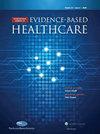为期一周的新闻培训课程对科学报道能力的感知影响:前瞻性调查
Q3 Medicine
International Journal of Evidence-Based Healthcare
Pub Date : 2023-10-03
DOI:10.17267/2675-021xevidence.2023.e5107
引用次数: 0
摘要
引言:在巴西,关于科学研究和报告完整性问题的辩论刚刚开始。文献表明,新闻培训课程有助于提高参与者的能力。目的:评估新闻学培训课程对学术能力感知的直接影响,包括知识、态度和技能。方法:该课程连续5天向健康科学专业的在线观众讲授。在课程开始前和结束后,采用了一份自我填写的问卷,包括初始和获得的感知知识,态度,技能。配对样本采用Wilcoxon非参数检验进行分析。结果:共有45人参加了该课程,前后有效率为53%。每次课程的参与者人数在32到45人之间。(1)撰写评论文章;(2)研究的伦理方面;(三)科学作者;(四)掠夺性行为;(5)发表偏倚和spin;(6)研究者评价。自我报告对任何项目的态度都没有改善。在以下方面的技能认知上有了改善:(1)写回应信和(2)作为评论者写意见。结论:总体而言,参与调查的参与者报告在某些项目中感知到知识和技能的提高,但在态度上没有。因此,这门课程似乎无法改变人们对科学报告能力的认知。本文章由计算机程序翻译,如有差异,请以英文原文为准。
Perceived impact of a one-week journalology training course on scientific reporting competencies: prospective survey
INTRODUCTION: The debate on scientific research and reporting integrity issues in Brazil is incipient. Literature suggests that a journalology training course could help to improve the competencies of the participants. OBJECTIVE: To evaluate the immediate impact of a journalology training course on perceived academic competencies, comprised of knowledge, attitudes, and skills. METHODS: The course was taught in 5 consecutive days to an online audience of individuals from the health sciences. A self-applied questionnaire was employed before and immediately after the course, which included initial and acquired perceived knowledge, attitudes, skills. The Wilcoxon non-parametric test for paired samples was used for analysis. RESULTS: A total of 45 individuals participated in the course, with a 53% response rate before and after. The number of participants in each course session ranged between 32 and 45. There was an improvement in perceived knowledge of: (1) writing review articles; (2) ethical aspects of research; (3) scientific authorship; (4) predatory practices; (5) publication bias and spin, and (6) researcher evaluation. There was no improvement in self-reported attitudes towards any item. There was an improvement in the perception of skills relating to: (1) writing a response letter and (2) writing an opinion as a reviewer. CONCLUSIONS: Overall, attendees who participated in the survey reported perceived improved knowledge and skills in some items but not in their attitudes. Therefore, the course appears to have been unable to modify perceived scientific reporting competencies.
求助全文
通过发布文献求助,成功后即可免费获取论文全文。
去求助
来源期刊

International Journal of Evidence-Based Healthcare
Medicine-Health Policy
CiteScore
1.80
自引率
0.00%
发文量
39
期刊介绍:
The International Journal of Evidence-Based Healthcare is the official journal of the Joanna Briggs Institute. It is a fully refereed journal that publishes manuscripts relating to evidence-based medicine and evidence-based practice. It publishes papers containing reliable evidence to assist health professionals in their evaluation and decision-making, and to inform health professionals, students and researchers of outcomes, debates and developments in evidence-based medicine and healthcare.
The journal provides a unique home for publication of systematic reviews (quantitative, qualitative, mixed methods, economic, scoping and prevalence) and implementation projects including the synthesis, transfer and utilisation of evidence in clinical practice. Original scholarly work relating to the synthesis (translation science), transfer (distribution) and utilization (implementation science and evaluation) of evidence to inform multidisciplinary healthcare practice is considered for publication. The journal also publishes original scholarly commentary pieces relating to the generation and synthesis of evidence for practice and quality improvement, the use and evaluation of evidence in practice, and the process of conducting systematic reviews (methodology) which covers quantitative, qualitative, mixed methods, economic, scoping and prevalence methods. In addition, the journal’s content includes implementation projects including the transfer and utilisation of evidence in clinical practice as well as providing a forum for the debate of issues surrounding evidence-based healthcare.
 求助内容:
求助内容: 应助结果提醒方式:
应助结果提醒方式:


